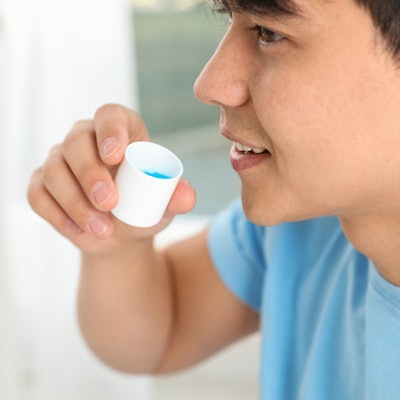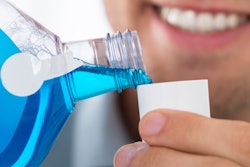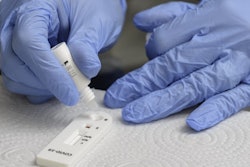
To prevent the spread of the virus that causes COVID-19, patients are sometimes asked to rinse with a disinfectant mouthwash during a dental visit. But a new study published on October 20 in the International Dental Journal suggests that these mouthwashes may change resin composites.
The in vitro study analyzed the effect of three disinfectant mouthwashes given to patients before dental procedures during the COVID-19 pandemic: 0.2% povidone iodine, 1% hydrogen peroxide, and 0.12% chlorhexidine. All three mouthwashes increased the surface roughness of resin composites immersed in the solutions.
"The acidity of the mouthwash caused polymer matrix decomposition of the resin composites ... causing fillers to easily extrude from the resin matrix," wrote the study authors, led by Saijai Tanthanuch of Prince of Songkla University in Thailand.
To test the effect of the disinfectant mouthwashes on the surface hardness and roughness of resin composites and color, the researchers fabricated 480 cylindrical composite molds 10 mm in diameter. They tested four types of bulk-fill and conventional resin composites.
The composite specimens were immersed in mouthwashes for one minute, simulating SARS-CoV-2 prevention efforts at dental offices, then stored in artificial saliva for 24 hours. The process was repeated for 14 days. Data of surface hardness, roughness, and color were recorded before immersion, seven days after the start of the experiment, and 14 days after the start of the experiment.
After immersion, all mouthwashes caused greater roughness on all resin composites. Additionally, the four resin composites all decreased in surface hardness.
"This resulted from the composition of mouthwashes that contain acids and the water absorption process," wrote the study authors.
Additionally, all four resin composites showed color challenges following immersion in the mouthwashes. This finding is consistent with previous studies showing that the color changes occur due to hydrolysis of the resin matrix, contact with acidic agents, and the water-absorbing properties of the materials.
Out of the three mouthwashes studied, povidone iodine had the most drastic effects. It caused the most significant decrease in surface hardness, the highest increase in roughness, and the most noticeable color changes in the resin composites.
As for the restorative materials, the study's authors suggest that Filtek Z350 XT (3M) is the most appropriate for withstanding wear from mouthwashes. The silica-zirconic resin had the fewest changes in surface hardness, roughness, and color in the study, while Premise (Kerr) had the most changes.
"The most significant finding in this experimental study was that the use of mouthwash before performing dental procedures in the novel COVID-19 epidemic (gargle for 1 minute and then spit out) affected the resin composite restoration materials evaluated," the study authors wrote.



















